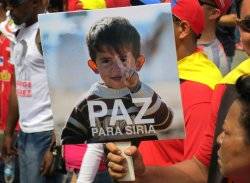Russia has shared with the US its plan to put Syria's chemical weapons under international control, one day before a meeting between the two nations’ top diplomats, reports said.
Sergey Lavrov, the Russian foreign minister, and John Kerry, the US secretary of state, are preparing to talk on Thursday amid a diplomatic deadlock over a suspected chemical attack in Damascus on August 21.
"We handed over to the Americans a plan to place chemical weapons in Syria under international control. We expect to discuss it in Geneva," a Russian source was quoted as saying on Wednesday by Russian news services.
Also on Wednesday, France produced a draft resolution for the UN Security Council that would put Syria’s chemical weapons under international control and condemn their use by President Bashar al-Assad’s forces.
Reporting from the UN in New York, Al Jazeera’s diplomatic editor James Bays said the French resolution was highly contentious and would probably be rejected by Russia, an ally of the Syrian government.
"This first draft of the French resolution is simply the negotiating position of the West, things now move to Geneva," he said.
The plan for Syria to relinquish its chemical weapons, initiated by Russia, appeared to ease the crisis over looming US-led military strikes against Assad's government.
However, concerns now remain over a potential impasse after Russia rejected US and French demands for a binding UN resolution with "very severe consequences" for non-compliance.
Last week, US President Barack Obama threatened military action against Syrian army targets over the alleged August 21 chemical attack.
But public support for military action has been low in the US, and in a televised speech on Wednesday announced Obama was postponing a congressional vote on the matter.
He said that he still retained to right to order military strikes, adding: "I've ordered our military to maintain their current posture to keep the pressure on Assad and to be in a position to respond if diplomacy fails.
"Let me make something clear: The United States military doesn’t do pinpricks. Even a limited strike will send a message to Assad that no other nation can deliver."
Opposition disappointment
Obama's decision to seek a diplomatic resolution was a disappointment for many in the Syrian opposition.
"We believe the regime is just buying more time, is just trying to fool the international community, is just trying to get out of this situation," said Louay al-Mikdad, a spokesman for the Free Syrian Army, a loose-knit alliance of rebel factions that is backed by the West.
"We don't believe that this delay for any kind of intervention will stop the regime from killing Syrian people or be for the Syrian people's benefit."
But Obama's decision was welcomed by Assad's close ally Iran, which has provided military and financial support to the Syrian government since the uprising began in March 2011.
"We hope that the new US attitude toward Syria would be a serious policy and not a media campaign," Iranian state TV quoted Supreme Leader Ayatollah Ali Khamenei as saying.
Also on Wednesday, UN human rights investigators released a report finding that both sides were guilty of committing war crimes in Syria’s ongoing civil war that has left more than 100,000 people dead.
PHOTO CAPTION
A government supporter marches with a sign that reads in Spanish; "Peace for Syria," in a demonstration against possible U.S. military action in Syria, in Caracas, Venezuela, Wednesday, Sept. 11, 2013.
Aljazeera


 Home
Home Discover Islam
Discover Islam Quran Recitations
Quran Recitations Lectures
Lectures
 Fatwa
Fatwa Articles
Articles Fiqh
Fiqh E-Books
E-Books Boys & Girls
Boys & Girls  Articles
Articles










